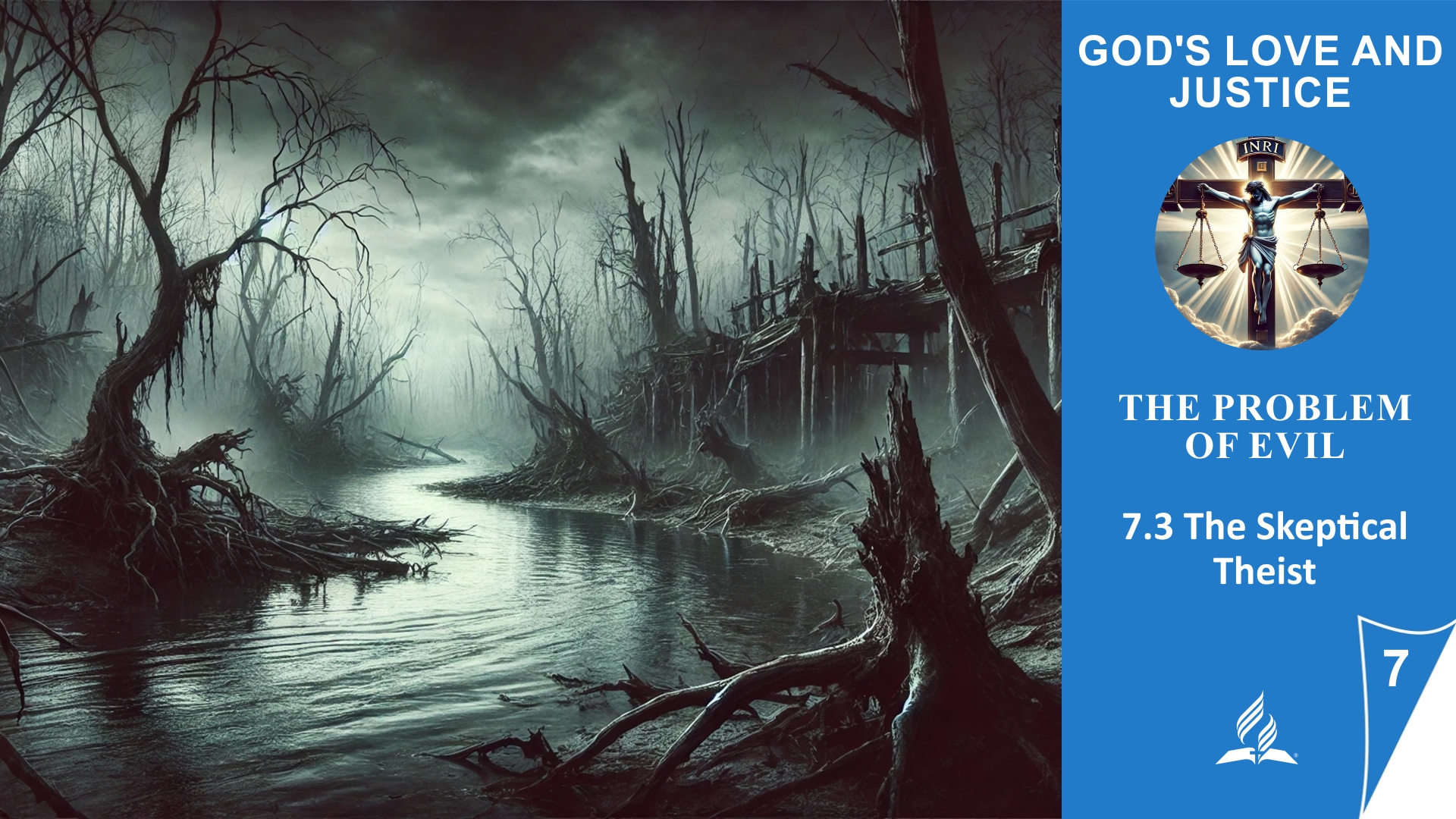


7.3 The Skeptical Theist
Trusting in God’s Higher Ways Despite Unanswered Questions
God says in Isaiah 55:8–9 that His thoughts and ways are far higher than ours. This reminds us that we cannot expect to fully understand God’s actions in all their depth.
-
Why Can’t We Fully Comprehend God’s Plans?
Our knowledge is limited, yet God’s plan encompasses the entire history of humanity. We see only a small slice of reality, while God knows the whole picture.
An example:
Just because we do not see an apparent reason for a difficult situation does not mean that there is none.
👉 Think of a child who does not understand why a doctor gives a painful injection—the child only sees the pain, not the healing.
-
Skeptical Theism as an Answer to the Problem of Evil
A skeptical theist acknowledges that God has good reasons for His actions—or inactions—even if we do not understand them.
💡 Practical Application:
Learn humility: Accept that we do not have to know everything.
• Develop trust: God’s higher thoughts are reliable—even if they seem incomprehensible to us.
• Be skeptical of hasty judgments: Just because we do not see meaning in suffering does not mean that it is meaningless.
-
Conclusion: Faith Means Trust, Not Complete Understanding
We will not always have all the answers—but we can trust that God has good reasons, even if we do not see them.
Read Psalm 73. How does the psalmist deal with the evil and injustice surrounding him? What does he see that gives his understanding a different perspective?
Psalm 73 describes the inner struggle of a man confronted with evildoers who seemingly prosper while he, as a believer, suffers. The psalmist Asaph wrestles with this injustice and poses the same questions that many of us face:
👉 Why do the wicked seem to succeed while the righteous suffer?
-
The Inner Conflict of the Psalmist (Verses 1–16)
He sees that the wicked live rich, healthy, and carefree lives, while he himself experiences difficulties.
• He begins to doubt and wonders whether it is even worthwhile to live righteously.
• He feels frustrated and confused because he cannot find any sense in this injustice.
🙋 This is an experience many of us share: sometimes it seems as if evil triumphs and God’s justice is not visible.
-
The Turning Point – A New Perspective (Verses 17–22)
💡 “Until I went into the sanctuary of God and considered all this, I was senseless and ignorant.” (Psalm 73:17)
Here the psalmist’s perspective changes! He realizes that:
✔ The apparent security of the wicked is deceptive—their power and wealth are only short-lived.
✔ God will ultimately bring about justice—even if it does not seem so at the moment.
✔ The life of the righteous has a deeper value, even though it may sometimes be more difficult.
-
The Psalmist’s Realization (Verses 23–28)
🙏 “Yet I am always with you; you hold me by my right hand.” (Psalm 73:23)
The psalmist recognizes that true happiness does not lie in material success, but in closeness to God. He understands that God’s presence and His eternal justice are the most important things.
Conclusion: What Can We Learn from Psalm 73?
1️⃣ Our view of evil can be distorted. What now appears powerful is not permanent.
2️⃣ True wealth is found in communion with God. Success and power without God are worthless.
3️⃣ God’s justice will come—even if we do not immediately see it.
✨ When we are frustrated by injustice, it helps to change our perspective—just as Asaph did when he entered the sanctuary of God. There, he understood that the final word does not belong to evil but to God alone.
How can the Adventist understanding of the judgment and the sanctuary doctrine shed light on the problem of evil? Is it helpful for you to know that although we have many questions now, the details of human history and God’s just judgments will eventually be revealed?
The Adventist understanding of the judgment and the sanctuary doctrine offers a deeper perspective on the problem of evil. It shows us that God not only allows evil but has a plan to ultimately defeat it and restore justice.
-
The Heavenly Sanctuary – God’s Plan to Overcome Evil
According to the Adventist understanding, there is a universally visible ministry of Jesus in the heavenly sanctuary (Hebrews 8–9). This ministry demonstrates that God is actively working to resolve the problem of sin.
Jesus, as our High Priest, mediates between God and humanity and advocates for the salvation of believers.
• The sanctuary makes clear that evil does not endure forever, but that God will ultimately eliminate sin and injustice.
-
The Investigative Judgment – God’s Just Plan
The Adventist doctrine of the Investigative Judgment (Daniel 7:9–10; Revelation 14:6–7) emphasizes that God exercises transparent justice:
✔ God does not judge arbitrarily but with complete knowledge of all facts.
✔ All questions about God’s justice will be clarified so that the universe understands His character.
✔ Evil will not only be punished, but it will be exposed as unjust for all to see.
This means that every deed will be revealed, and God’s judgment will be understandable to everyone.
-
The Ultimate Eradication of Evil
At the end of human history, evil will not only be condemned but completely destroyed (Revelation 20:11–15).
Satan and his works will be finally eliminated.
• God will create a new earth where there will be no more suffering (Revelation 21:4).
• The righteous will come to understand why God did not intervene at certain moments and will see that He was just in all things.
-
Is It Helpful to Know That God’s Judgment Will Clarify All Questions?
Yes, because:
✔ It shows that God is just, even if we do not always see it now.
✔ It gives hope that evil will not endure forever.
✔ It assures us that our suffering is not in vain—God sees and will act.
💡 God’s judgment is not a threat but a promise: It will ultimately prove that God has always been just and that evil will never exist again.
✨ The knowledge of the sanctuary and the judgment gives us assurance: God will not only defeat evil but also answer our questions—we will clearly recognize His justice.
The Adventist understanding of God’s justice, the judgment, and the sanctuary gives us a perspective that deeply influences our daily lives and our faith. It helps us live in trust and hope despite the many open questions we have.
-
Trusting in God’s Ways – Even When We Do Not Understand Them
👀 In everyday life, we often experience injustice and suffering. Sometimes it seems as if the “wicked” succeed and the righteous suffer—just as the psalmist describes in Psalm 73.
💡 Yet the sanctuary and the judgment remind us that:
✔ God has the full picture—even if we do not see it.
✔ Every deed will eventually be revealed—God’s judgment will show that He has always been just.
✔ Our questions will be answered—even if it has not happened yet.
👉 Practical Application:
When we face injustice, we can remember that God has the final word.
• Instead of despairing, we can trust in God’s timetable.
-
A Life of Hope – Evil Will Not Endure Forever
🔎 Many people lose their faith because they cannot understand the existence of evil in the world. Yet the Adventist understanding of the judgment gives us a secure hope:
✔ God will not ignore evil—He will eliminate it!
✔ The righteous will not suffer forever—God will bring justice.
✔ There is a plan—the universe will recognize that God’s ways are perfect.
👉 Practical Application:
When we face challenges, we can recall Revelation 21:4: “He will wipe away every tear… and death will be no more.”
• Our task is to hold on to God’s promises and not fear evil.
-
A Lifestyle of Humility and Patience
🔄 The skeptical theist teaches us that we do not have to have all the answers to trust God.
👶 A child does not always understand why his parents do something—but he can trust them.
Similarly, we may trust that God’s ways are higher than ours (Isaiah 55:8–9).
👉 Practical Application:
Instead of getting upset over unanswered questions, we can ask God for patience and trust.
• Cultivate humility—recognize that our knowledge is limited, but God sees the bigger picture.
Conclusion: Faith Means Trust, Not Complete Understanding
💡 We do not know everything—but we know enough to trust.
✔ God is just, even if we do not always see it.
✔ Evil will not endure forever.
✔ We may live with hope—because God’s plan will be fulfilled.
🙏 This perspective changes our lives: It gives us strength when we feel powerless, hope when we doubt, and courage even when we do not understand everything.

God’s ways are higher than ours—even if we do not understand everything, we can trust Him completely.
(Visited 22 times, 1 visits today)






















